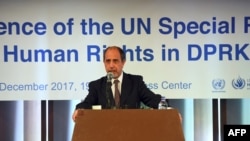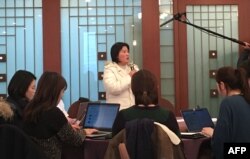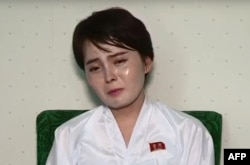A United Nations independent expert on alleged North Korean human rights violations was put on the defensive in Seoul Thursday, over South Korea’s opaque treatment of defectors.
Tomás Ojea Quintana, an Argentinean human rights lawyer who was appointed in 2016 as the U.N. Special Rapporteur on the situation of human rights in North Korea, held a press conference after wrapping up a four-day visit to South Korea this week, where he met with various government officials, aid organizations and North Korean defectors.
Asylum seekers
In his statement to the press he mentioned the case of the 12 North Korean women restaurant workers who escaped from China to seek asylum in South Korea in 2016, shortly after the United Nations imposed a round of economic sanctions on Pyongyang for conducting a nuclear test earlier in the year.
North Korea has demanded the return of these defectors, charging that they were abducted by South Korean agents.
Quintana said he wanted to meet with meet with the women to independently verify that they had come to the South of their own accord, but was not able to do so. Asked if South Korea denied him access to the women, he was very careful in his response.
“The South Korean government, I would say, is not preventing me to interview them, but there are some limitations in terms of, I would say, organizing the encounter with these women,” said Quintana.
South Korea often will not release any information about defectors, purportedly to protect families of the defectors that are still in North Korea from any government retribution.
A 2014 United Nations Commission of Inquiry report on human rights in North Korea documented cases of sending families of defectors, including children, to prison camps as a form of collective punishment for alleged anti-state offenses. Detainees, human rights groups say, face deplorable conditions, killings, rape, beatings and torture by guards, and forced labor in dangerous and sometimes deadly conditions.
Disillusioned defector
Also at the U.N. press conference, Kim Ryon-hui, a North Korean defector, said she is being prevented against her will from returning home to North Korea, and asked Quintana his assessment of this type of South Korean human rights violation.
The U.N. Special Rapporteur answered by reiterating his mandate to assess North Korean human rights issues, not those in South Korea.
“So I am not in a position to respond to your question,” he said.
Kim Ryon-hui’s story is murky. She later said she came to South Korea seven years ago for medical treatment, but that a broker who she paid to help her escape deceived her into thinking she could return at any time.
However she said the South Korean government is preventing her from going home to her family, citing the national security law that bans travel to North Korea. Defectors who want to return home also face increased scrutiny and concerns that they may be involved in espionage for North Korea.
Kim said she purposely tried to pretend she was a North Korean spy to be kicked out of the country. She was arrested but said the espionage charge was dismissed.
“In the sentencing, it is written that this person came to South Korea without willingness, but could not be sent back because there is no way to send her back. The law recognized that I came here without my willingness,” said Kim.
Thousands of North Koreans have sought asylum in South Korea over the past decade, and more than 30,800 former North Koreans now live in the South. Since 2012, there have been 25 confirmed cases of defectors who returned to the North; five of those later changed their minds and re-defected to South Korea, according to Seoul's Unification Ministry.
In July, the case of a defector Lim Ji-hyun, who became a TV celebrity in the South, and then suddenly "returned home," left many wondering if she was abducted by the North.
At the end of the briefing, journalists gathered around the North Korean defector to hear her criticism of South Korea, rather than focus on the Special Rapporteur’s report on North Korean violations.
Youmi Kim in Seoul contributed to this report.















